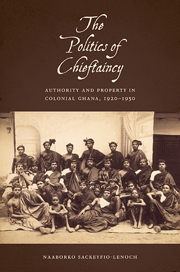Book contents
- Frontmatter
- Dedication
- Contents
- List of Illustrations
- Acknowledgments
- Abbreviations
- Introduction: Contesting Space and Authority in a Colonial Capital
- 1 Situating Ga Institutions in the European Colonial Milieu
- 2 Land Legislation, Commodification, and Effects in Accra
- 3 Negotiating Chieftaincy, the Ga Stool, and Colonial Intervention
- 4 Succession Disputes, the Ga State Council, and the Future of Chieftaincy
- 5 Contesting Property in Accra and Its Periurban Locales
- Conclusion
- Notes
- Bibliography
- Index
1 - Situating Ga Institutions in the European Colonial Milieu
Published online by Cambridge University Press: 05 October 2014
- Frontmatter
- Dedication
- Contents
- List of Illustrations
- Acknowledgments
- Abbreviations
- Introduction: Contesting Space and Authority in a Colonial Capital
- 1 Situating Ga Institutions in the European Colonial Milieu
- 2 Land Legislation, Commodification, and Effects in Accra
- 3 Negotiating Chieftaincy, the Ga Stool, and Colonial Intervention
- 4 Succession Disputes, the Ga State Council, and the Future of Chieftaincy
- 5 Contesting Property in Accra and Its Periurban Locales
- Conclusion
- Notes
- Bibliography
- Index
Summary
The Ga peoples who inhabited Accra and the surrounding area when Henry Morton Stanley arrived in 1873 were not the first residents of the region, and they did not originate from one single ethnic enclave with a homogeneous set of traditions. Rather, various Ga-speaking immigrants emerged from eastern areas of the interior Gold Coast and settled in family or other groups among the aboriginal Kpeshi peoples of the southern coastal region beginning in the fifteenth century, arriving in different areas at different times. Over time the Ga gradually achieved demographic, linguistic, and political ascendancy over the neighboring Guang-speaking peoples. As Ga groups traveled along the coast searching for places to settle, they mingled and formed a fraternal base. The descendants of the original migrants are known collectively as Ga Mashi, thereby distinguishing them as “true” Ga.
By the sixteenth century the Ga had moved into the plains south of the Akuapem escarpment, and within another hundred years they had moved farther toward the coast; archaeological evidence dates the origins of settlement in the area known as Greater Accra to the late 1500s. Over time the original settlements united but retained customs associated with their distinct origins and evolved into the seven quarters of Central Accra, with Asere, Abola, and Gbese considered the oldest. Alata, Sempe, and Akumaji constituted another set of quarters. Otublohun emerged between 1680 and 1730, when the Akwamu controlled the Ga government at Accra.
- Type
- Chapter
- Information
- The Politics of ChieftaincyAuthority and Property in Colonial Ghana, 1920-1950, pp. 23 - 39Publisher: Boydell & BrewerPrint publication year: 2014



